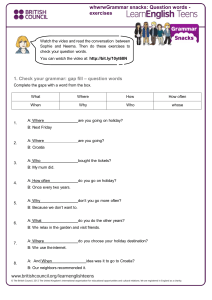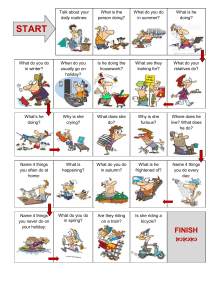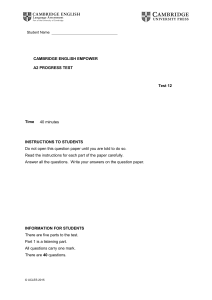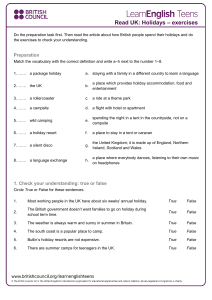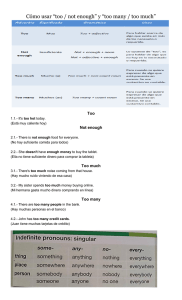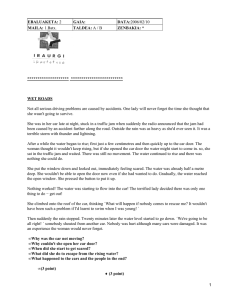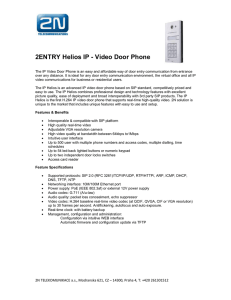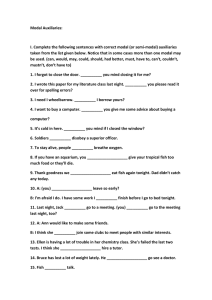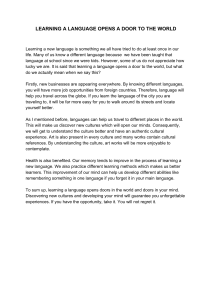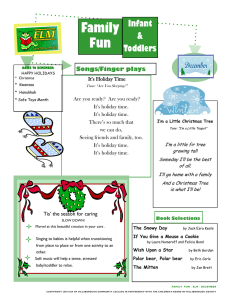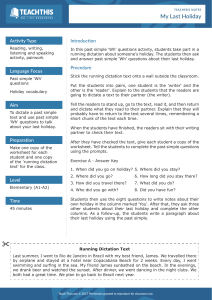PHRASAL VERBS Break down Break (something) down Bring (someone) up
Anuncio
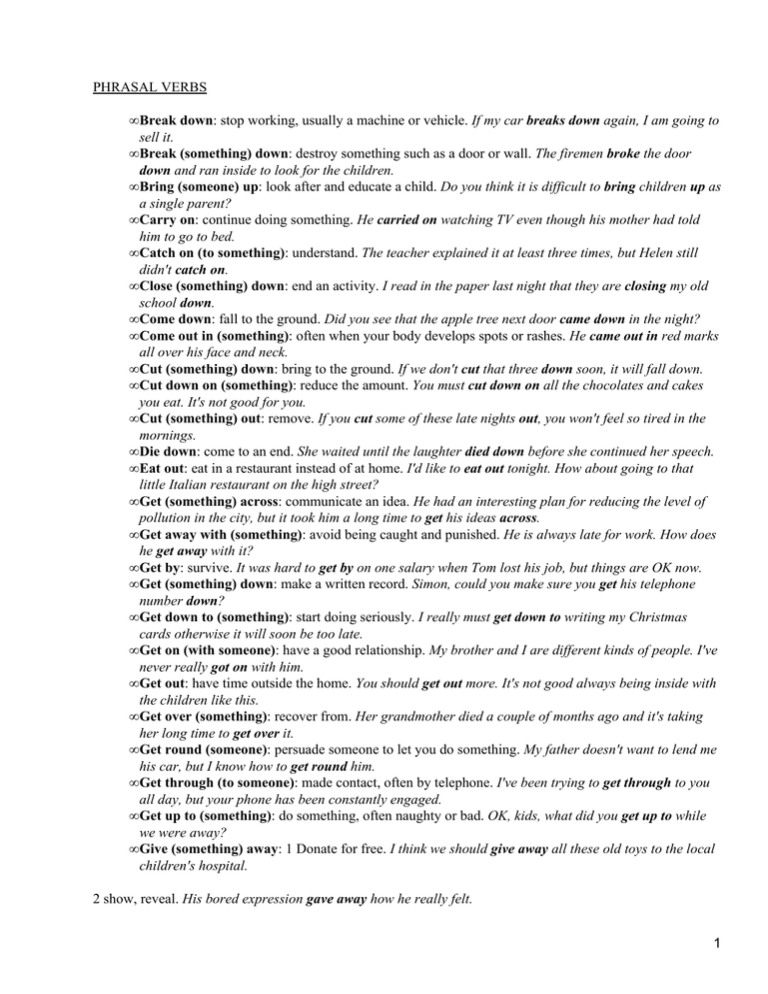
PHRASAL VERBS • Break down: stop working, usually a machine or vehicle. If my car breaks down again, I am going to sell it. • Break (something) down: destroy something such as a door or wall. The firemen broke the door down and ran inside to look for the children. • Bring (someone) up: look after and educate a child. Do you think it is difficult to bring children up as a single parent? • Carry on: continue doing something. He carried on watching TV even though his mother had told him to go to bed. • Catch on (to something): understand. The teacher explained it at least three times, but Helen still didn't catch on. • Close (something) down: end an activity. I read in the paper last night that they are closing my old school down. • Come down: fall to the ground. Did you see that the apple tree next door came down in the night? • Come out in (something): often when your body develops spots or rashes. He came out in red marks all over his face and neck. • Cut (something) down: bring to the ground. If we don't cut that three down soon, it will fall down. • Cut down on (something): reduce the amount. You must cut down on all the chocolates and cakes you eat. It's not good for you. • Cut (something) out: remove. If you cut some of these late nights out, you won't feel so tired in the mornings. • Die down: come to an end. She waited until the laughter died down before she continued her speech. • Eat out: eat in a restaurant instead of at home. I'd like to eat out tonight. How about going to that little Italian restaurant on the high street? • Get (something) across: communicate an idea. He had an interesting plan for reducing the level of pollution in the city, but it took him a long time to get his ideas across. • Get away with (something): avoid being caught and punished. He is always late for work. How does he get away with it? • Get by: survive. It was hard to get by on one salary when Tom lost his job, but things are OK now. • Get (something) down: make a written record. Simon, could you make sure you get his telephone number down? • Get down to (something): start doing seriously. I really must get down to writing my Christmas cards otherwise it will soon be too late. • Get on (with someone): have a good relationship. My brother and I are different kinds of people. I've never really got on with him. • Get out: have time outside the home. You should get out more. It's not good always being inside with the children like this. • Get over (something): recover from. Her grandmother died a couple of months ago and it's taking her long time to get over it. • Get round (someone): persuade someone to let you do something. My father doesn't want to lend me his car, but I know how to get round him. • Get through (to someone): made contact, often by telephone. I've been trying to get through to you all day, but your phone has been constantly engaged. • Get up to (something): do something, often naughty or bad. OK, kids, what did you get up to while we were away? • Give (something) away: 1 Donate for free. I think we should give away all these old toys to the local children's hospital. 2 show, reveal. His bored expression gave away how he really felt. 1 • Give (something) back: return. Lend me £10, will you? I promise I'll give it back tomorrow. • Give in (to someone): surrender, agree to what someone else wants. You shouldn't give in to him if you think he is wrong. • Give off (something): produce. Plastic gives off a horrible smell when it is burnt. (Note that in this case the verb and the adverb cannot be separated.) • Give (something) out: distribute. The teacher gave files and books out to all the students. • Give (something) up: stop. All my friends have given smoking up this year. It's incredible. • Go down: Fall. The price of houses has gone down by five per cent in the last year. • Go on: continue doing something. She went on talking while he made lunch. • Grow up: become an adult. I grew up in the north of England, but I moved down to London for my first job. • Hold on: wait. Could you hold on for a moment while I get a pen and paper? • Keep on: continue doing something. It kept on raining for the rest of the day. • Keep up (with someone): maintain the same level. It's very difficult to keep up with her because she walks so fast. • Let (someone) off: give someone a light punishment or no punishment at all for something they have done wrong. As it was his first offence the judge let him off with a small fine. • Look after (someone/something): take care of. Would you mind looking after our cats while we are away on holiday? • Look out: pay attention, be careful. Look out! There's a car coming. • Look (something) up: find information, often in a reference book. He looked up all of the new words in his bilingual dictionary. • Look up to (someone): admire, respect. I have always looked up to my mother. She's do patient and kind. • Make for (someone/something): go towards. They made for the nearest café when it started to rain. • Make of (something): think of. What do you make of that new book by Jason Bryan? I couldn't understand a word of it! • Make out: pretend. She made out that she had been at home all evening when in fact she had gone out to see Martin. • Make (something) out: See clearly. I can see someone coming towards us, but I can't make out who it is. • Make (something) up: invent. I don't believe what she told us about meeting Elton John. I think she is making it up. • Make (a room, bed, etc.) up: prepare. We need to make the spare room up if Jim is going to stay her tonight. • Make (time) up: get back. We left late, but if I drive fast, I think we can make up the lost time. • Make up (with someone): become friends again. You shouldn't get angry with your sister. Please go and find her and make up. • Mind out: pay attention. Mind out! You nearly walked in that puddle. • Pick on (someone): treat someone badly or unfairly. The other boys are really horrible to Michael. They're always picking on him. • Pick (something) up: learn. He's very quick. You just tell him how to do something once and he's picket it up. • Put (money) by: save. I try and put a little by each month. We'd like to go on a holiday to the Greek islands next year. • Put (an animal) down: destroy. It was very sad. Our horse broke its leg and was in terrible pain. We had to have it put down. • Put (someone) down: criticise someone or try and make them look stupid or insignificant. I think he puts me down in meetings because he never has any ideas of his own. • Put (something) off: postpone, make later. Can we put the football match off for a week because some of our team are ill with flu? • Put (something) out: extinguish. Could you put your cigarette out, please/this is a no−smoking area. 2 • Put (someone) through: connect (specially by telephone). Could you put me through to Mr Jenkins' secretary, please? I need to change the time of my appointment. • Put (someone) up: give accommodation. Of course we can put you up for a few days while you're looking for a flat. There's no problem − we've got a spare room. • Put (the price) up: increase. If we put up our prices again, we're going to lose some of our best customers. • Put up with (someone/something): tolerate. I can't put up with the noise from next−door's party anymore. I am going to ask them to turn the music down. • Rub (something) out: remove something (usually with a rubber or a cloth). I think you should rub the first part of your essay out and try again. • Run out (of something): finish, have no more left. Could you buy some more milk when you go to the shop. We have nearly run out. • Sell out (of something): finish because everything has been bought. I'm sorry; we've sold out of bread. Why don't you try the supermarket? • Slow down: reduce speed. Please slow down. You're driving so fast, it's making me frightened. • Speak up: say things more loudly. You need to speak up a little, I'm afraid I can't hear very well. • Stand out: appear clearly. He usually stands out in a crowd. He's well over two metres tall! • Stay our: remain away from home. Your mother doesn't like you staying out all night. Please be home by midnight. • Stick out: appear clearly. I'm going to really stick out at school. I'm the only person who hasn't got a pair of the right kind of trainers. • Take after (someone): be similar to in character. He takes after his father, he's very friendly and outgoing. • Take (something) down: write, make a note of. Sharon, could you take down the following letter for Brian Stevens at CBC) • Take (someone) in: make someone believe something which isn't true. When he told her he had come to check the gas meter, she was completely taken in. • Take off: suddenly increase, do well. Interest in the environment has taken off in the last couple of years and I don't really understand why. • Take (someone) off: imitate someone to make other people laugh. You should hear Simon taking off the Prime Minister − he's very funny. • Take (time) off: have a holiday/change. You should take a few days off work, you're not looking at all well. • Take (someone) on: employ. I'm thinking of taking another secretary on. Do you know anybody suitable? • Take (something) over: take control. He's very dominating. When he joins a discussion, he usually takes over and no one else has a chance to say anything. • Take (something) up: start a new hobby. I've taken up yoga recently. It's changed my life. • Take up (space/time): occupy. This sofa takes up far too much room in here. We should move it downstairs. • Tell (someone) off: speak to someone angrily because they have done something wrong. My Maths teacher told me off for not paying attention in class. • Throw (something) out: get rid of. Don't throw those boxes out. They might come in useful one day. • Watch out: pay attention. Watch out! There's a car coming. • Wear (someone) out: to make very tired, no energy left. I've spent the day shopping, cleaning and cooking and now I'm worn out. • Work (something) out: calculate. You've been trying to do that puzzle for ages. Haven't you worked it out yet? 3

